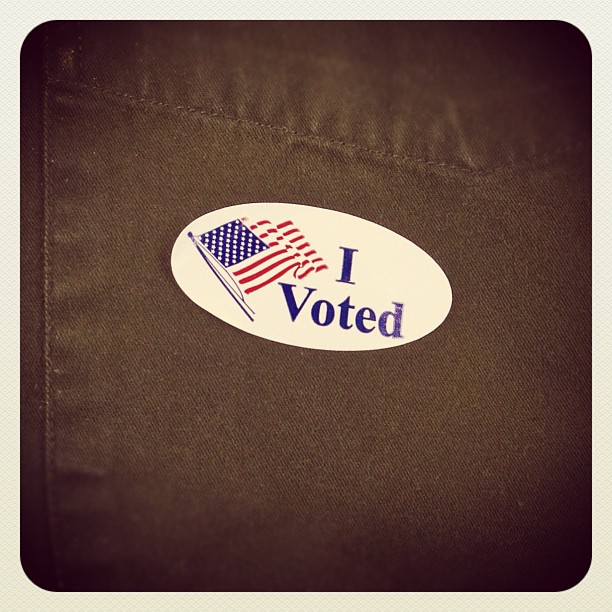 In an essay published at the Atlantic online, TIF editor-at-large Steven Barrie-Anthony urges politicians and pundits to pay closer attention to “spiritual but not religious” voters as a potentially influential bloc:
In an essay published at the Atlantic online, TIF editor-at-large Steven Barrie-Anthony urges politicians and pundits to pay closer attention to “spiritual but not religious” voters as a potentially influential bloc:
There is the potential for spiritual voters to exert major influence this year and in 2016. Religiously unaffiliated voters are strongly Democratic in national elections, and a majority are socially progressive on issues such as abortion and same-sex marriage. But there is growth possibility for Democrats. While religious nonaffiliation has expanded rapidly in recent years, “nones” account for a flat 12 percent of voters in presidential contests since 2008. Over the same period, the percentage of “nones” identifying as Democrats fell slightly, while the percentage identifying as independents increased to half—good news for Republicans and third-party candidates. Republicans are unlikely to wring much from spiritual voters; but Democrats stand to gain significantly, or lose out, depending on their ability to inspire them.
The question is, will politicians study the category well enough to identify and appeal to broadly shared values and longings? Spiritual voters are a diverse cohort and do not come hand-delivered as a political bloc—but there are shared values and experiences that call out for political cultivation. Their support for progressive causes links up with a broader unease with religious, political, and financial institutions viewed as tainted by wrongheaded values and jaded self-interest.
But the other side of religious nonaffiliation, and what politicians often neglect, is that for spiritual voters the sacred strongly persists. Reading them narrowly as atheists or secularists misses out on the political rewards that come from constituents feeling seen and understood. This sacred is various, but it coheres for many in its resistance to religious enclosure and its support of certain progressive values. Politicians fire up religious blocs through careful attunement to religious values. Better attunement to spiritual values will help inspire spiritual voters.
Read the full essay here.













Steven Barrie-Anthony’s post about the importance of appealing to a bloc of voters who identify as “spiritual but not religious” falls into the same trap as do many issues that concern finding common ground between groups in a secular age. Barrie-Anthony stresses the importance of politicians attracting spiritual voters’ interest by acknowledging and appreciating their values. However, it is an arduous task for politicians to identify and understand shared values when it is improbable that those exist. The frequent critique of a secular society is that there is no framework of morality that applies to every individual. Due to the acceptance of all religious beliefs and values in a pluralistic and increasingly tolerant society, the lack of authority that one morality holds over another lends itself to an individualistic system in which there is disparity even within supposedly uniform groups such as Catholics or Muslims. This lack of homogeneity becomes problematic in political situations that require politicians to place voters for their convenience into groups with similar values and desires. Barrie-Anthony admits, “Spiritual voters are a diverse cohort and do not come hand-delivered as a political bloc.” However, politics necessitates this type of classification, despite the sundry nature of current religious groups’ resistance to this system.
Whereas the problem is applicable to religious groups, it is exacerbated when dealing with clusters that are not defined by their identification with a certain religious tradition, such as “nones.” With members comprising such a large umbrella group, it is unproductive to assume that just because they do not adhere to the values of a certain faith, which are not even uniform, that they must necessarily identify with “progressive values.” Barrie-Anthony’s plea that politicians should become better attuned to “spiritual values” is an impossible request because such values do not exist; one can never distinguish values that apply to all voters who identify as “spiritual but not religious,” a title that already contains two terms that resist simple definitions, let alone accompanying values. The fluctuation in party identification among the “nones” that Barrie-Anthony points out attests to this fact. While he acknowledges the danger in classifying spiritual voters as atheists or secularists, this warning against a narrow reading does not adequately acknowledge the extent to which spiritual voters’ values vary, especially within the context of our tolerant secular age. So while there may indeed exist a link between spiritual voters’ “unease with religious, political, and financial institutions” and “progressive causes,” to assume that all spiritual voters possess that unease is a generalization, which renders the link weak. Therefore, appealing to spiritual voters as a unified group will not ultimately benefit politicians due to spiritual voters’ assorted motivations for identifying as spiritual and their accordingly diverse values.